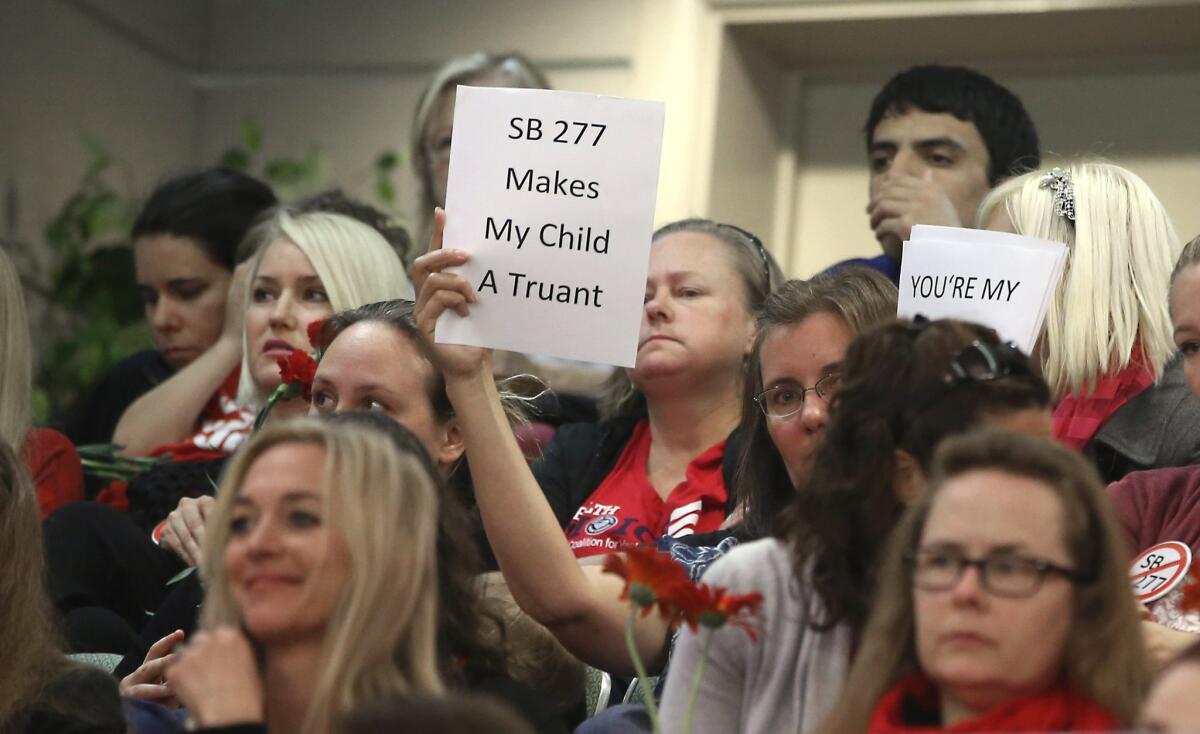Third panel backs bill to mandate more children be vaccinated

- Share via
Reporting from Sacramento — A bill that would force more schoolchildren in California to get vaccinated cleared its third and final policy committee in the state Senate despite arguments from opponents that the measure would unconstitutionally deprive young people of an education.
The Senate Judiciary Committee weighed the legal implications of SB 277, which would eliminate the current ability of parents to exempt their children from vaccines based on personal beliefs. Under the bill, the only children who would be exempted from vaccinations are those determined to have a medical condition that would put their health at risk if given a shot.
The committee voted 5 to 1 to send it to the Senate Appropriations Committee for consideration of its costs after Chairwoman Hannah-Beth Jackson said the government has a compelling interest to require vaccines.
“This bill ultimately is about the health and well-being of our children and what in the world is more important than that,” Jackson said. “It is our responsibility to protect the public health and safety.”
Jackson is a coauthor of the bill that was introduced by Democratic Sens. Richard Pan of Sacramento and Ben Allen of Santa Monica.
The authors agreed to changes Tuesday that include limiting the mandate to 10 current vaccines required by the state. If the state Department of Public Health decides to require other vaccines, they would be subject to a personal belief exemption, Pan and Allen agreed.
Republican Sen. Joel Anderson of San Diego opposed the bill, saying he does not think parents should lose the ability to choose against vaccines if there might be health risks. “This is a very dangerous road that we are gambling on,” he said.
Allen said the courts have repeatedly found that vaccination programs are a constitutionally permissible power of the state. Pan said that the compelling interest of government is to protect the public from diseases.
They were backed in testimony by Dorit Reiss, a law professor at UC Hastings College of the Law in San Francisco. Reiss said California is in a minority of states to allow a personal belief exemption.
“SB 277 is a constitutional way to help improve immunization rates and protect our children from communicable diseases,” she told the panel.
Opponents, led by the California Coalition of Health Choice, brought in their own legal scholar, Mary Holland, director of the Graduate Legal Skills Program at New York University School of Law, who predicted the bill would not stand up to legal challenges in court.
“SB 277 stigmatizes and discriminates against a small minority of parents and children who chose to selectively vaccinate or not vaccinate,” Holland told the committee. “I do believe that SB 277 would create a kind of segregation in its current form.”
She also said it violates the concept of informed consent in medical decisions because it is “coercive. Parents will be vaccinating children under duress.”
Dozens of people, many dressed in red, testified against the bill. Several opponents said it violates their parental rights.
Tara Zandvliet, a physician, said the law is unfair because it does not allow her to give a medical exemption to the sibling of someone who had an adverse reaction from a vaccine. “Medical exemptions do not cover everything,” she told the panel.
More to Read
Sign up for Essential California
The most important California stories and recommendations in your inbox every morning.
You may occasionally receive promotional content from the Los Angeles Times.














